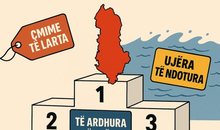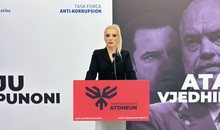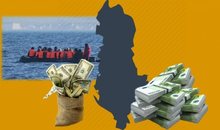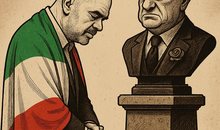

Nicholas Kristof / The New York Times
The irony is that there is a manual for overthrowing autocrats. It was written here in America, by a humble political scientist I knew named Gene Sharp. Although little known in the United States before he died in 2018, he was well-regarded abroad, and his “toolbox” was used by activists in Eastern Europe, the Middle East, and across Asia. His books, which emphasize peaceful protests becoming contagious, have been translated into at least 34 languages.
“I would rather have this book than the nuclear bomb,” a former Lithuanian defense minister once said of Sharp’s writings.
A quiet researcher working from his Boston apartment, Sharp recommended 198 actions, often symbolic, ranging from hunger strikes to sex boycotts to mock funerals.
“Dictators are never as strong as they pretend to be,” Gene Sharp once said, “and people are never as weak as they think they are.”
One of the lessons emerging from movements against authoritarianism around the world is that abstract arguments are not very effective. In contrast, three other approaches, which draw on Sharp's work, appear more successful.
The first is mockery and humor, preferably with a provocative subtext.
Wang Dan, one of the leaders of the pro-democracy demonstrations in Tiananmen Square in China in 1989, told me that in China, puns often “convey more than solemn political slogans.”
For a while, the Chinese internet was infatuated with “straw-clay horses,” which might confuse future zoologists exploring Chinese archives, since such an animal doesn’t even exist. It’s all a vulgar joke: in Chinese, “straw-clay horses” sounds a lot like a swear word, so harsh it would make your screen turn red. But on the surface, it’s just an innocent homonym for an animal, and that’s why it’s used to mock Chinese censorship.
Stores in China sold toy straw-clay horses (which resembled alpacas), and a fake nature documentary described their habits.
A Chinese song told the epic story of a battle between straw-clay horses and river crabs — because “river crab” is a play on the Chinese term for “censorship.”
The song optimistically proclaimed the victory of the straw-clay horses.
"They defeated the river crabs to protect their pastures," the song declared. "The river crabs disappeared forever."
Humor puts the autocrat in a difficult position.
He looks funny if he stops the jokes, but weak if he ignores them.
What can a dictator do?
Take, for example, President Xi Jinping of China, who is sometimes mocked for resembling the bear Winnie-the-Pooh.
So China bans images and films of Winnie-the-Pooh, which gives people even more reason to laugh at him.
Neither Winnie-the-Pooh nor a cavalry of straw-and-mud horses will topple Xi, but humor has helped before: It helped topple Serbian despot Slobodan Milosevic in 2000.
A dissident group called Otpor was so small that its protests would go unnoticed. But Otpor, drawing heavily on the work of Gene Sharp, engaged in street theater that caught the public’s attention:
In Belgrade, they placed an image of Milosevic on a barrel and asked passersby to hit it with baseball bats.
“Seeing a group of liberated youth mocking Milosevic made passersby smile,” writes Tina Rosenberg in her book “Join the Club,” “and encouraged them to think about the regime, and their role, in a different light.”
Rosenberg quotes one of the Otpor leaders as saying: “It was always like a big party.” This made the protest trendy and “cool,” the mockery spread like a virus, and in the end, the opposition grew into a mass movement that forced Milosevic to resign.
The second approach, which has often proven successful, is not to emphasize democracy as a principle, but to denounce the corruption, hypocrisy, and economic failures of autocratic leaders.
Critics usually have plenty of ammunition when it comes to hypocrisy, because autocrats like to pose as defenders of morality, while a lack of accountability often leads to… slippage.
An example: The police chief in Tehran, tasked with enforcing the Islamic dress code for women, was reportedly found naked in a brothel with six prostitutes, also naked.
Corruption is also an easy target, because as autocrats become more powerful, they and their families often decide to enrich themselves.
Wherever there is authoritarianism, there is corruption.
Chinese officials understand the sensitivity of this issue: They have told me that they have no problem if journalists like me criticize the Communist Party for repression or bad policies, but “can you not report on the finances of party leaders?”
(as in the case of the former prime minister, whose family was so “hardworking” that they rose from poverty to amass at least $2.7 billion.)
One of the people who seemed to most intimidate President Vladimir Putin was Alexei Navalny — a master of irony who posted videos showing off extravagances like Putin's personal "pleasure" palace worth an estimated $1 billion — and who, when imprisoned in the gulag, humorously announced that he had attempted to create a prison guards' union.
The third approach, which has often proven successful, is to focus on the power of an individual — a single tragedy, rather than a sea of oppression. Anti-apartheid protesters once used the slogan: “Free South Africa’s political prisoners,” but it didn’t catch on.
Then they changed it to: “Free Nelson Mandela” — and the rest is history.
Similarly, the Arab Spring began in 2010 with a shocking story:
A 26-year-old Tunisian street vendor set himself on fire to protest corruption, and then millions of Arabs took to the streets against their rulers.
In Iran, six months of protests began in 2022, when a young woman, Mahsa Amini, died after being arrested by police for wearing an inappropriate hijab.
“With her murder, people lost their patience and took to the streets,” Nasrin Sotoudeh, an Iranian human rights lawyer known for her advocacy, told me. Sotoudeh stressed that even a creative protest by an ordinary person can spark a broader movement.
She cited the woman who in 2017 stood on a Tehran street, removed her headscarf, and waved it on the end of a stick; the incident went viral and launched the “girls of the street of the revolution” movement to end the mandatory hijab.
And although the law on hijab still exists, today women sometimes ignore it without consequences.
We often think of politicians as the natural leaders of such movements. But it's surprising how often the figures who rise to the top come from completely different worlds: An electrician at a shipyard in Poland named Lech Wałęsa. A Czech playwright named Vaclav Havel. A female lawyer in Iran. An engineering student in Sudan. A widow and housewife in the Philippines named Corazon Aquino.
Latest news


"Article Basha, wrong"/ Bardhi against Berisha's removal with statute
2025-06-28 21:41:41
Two cars collide in Pogradec, 3 people injured
2025-06-28 21:29:25
The first from the end... Albania's unwanted "victories"
2025-06-28 21:10:43
War with Ukraine, Putin: I am convinced that Russia will win!
2025-06-28 20:54:16
ChatGPT "destroys" the human brain! New study publishes disturbing results
2025-06-28 20:31:34
Triple accident in Lapraka, two people injured
2025-06-28 20:13:39

EMRI/ Albanian cocaine smuggler risks life in prison in the US
2025-06-28 19:34:14

Rallies against Vučić continue, Belgrade prepares for major student protest
2025-06-28 18:23:29

A young man from Kosovo passes away after coming to Lezha on vacation
2025-06-28 17:42:10
Flames engulf the mountain in Maliq, flames near the former military tank depot
2025-06-28 17:18:08


Europe on heatwave alert, temperatures reach 42 degrees!
2025-06-28 16:19:55
Palm tree falls on "Epidamn" Boulevard in Durrës, blocking traffic
2025-06-28 15:58:08
WHO publishes final report on Covid-19: We cannot find its origin!
2025-06-28 15:42:16

A house in Shëngjin is destroyed by flames
2025-06-28 15:07:57

Police fire gun at vehicle in which young man was traveling
2025-06-28 14:44:02
4 caravans collapse in Tirana
2025-06-28 14:28:19
"Skënder's son and Gjergj's daughter, an Albania without competition"
2025-06-28 14:10:24

The Special Prosecution Office seizes assets worth around 12 million euros
2025-06-28 13:23:25


Fire in Lapraka, flames engulf the area in front of the 'Aleks Buda' school
2025-06-28 12:27:29

Abuses with UBT tenders, SPAK takes 28 lecturers and businessmen as defendants
2025-06-28 11:50:24


A year after his father's death, the famous former footballer also passes away
2025-06-28 10:55:45
Father and son arrested for cultivating cannabis in Tepelena
2025-06-28 10:36:23

Veliaj's paid PR as an instrument for manipulating public opinion
2025-06-28 10:02:46




Horoscope, discover the star forecast for your sign
2025-06-28 08:39:44
Weather forecast, how temperatures will change during the day
2025-06-28 08:22:06
Morning Post/ In 2 lines: What mattered yesterday in Albania
2025-06-28 07:54:37
Journalist: 1/4 of Albanian families live only on emigration money
2025-06-27 22:53:49
Residents of Astir denounce the mixing of drinking water with sewage
2025-06-27 22:29:46
The counterfeiter of the nation
2025-06-27 21:58:15




Trump speaks again about Kosovo and Serbia: they are about to clash in a big war
2025-06-27 21:10:27
Tragedy in France/ Plane crashes, 3 people die
2025-06-27 20:54:17
BIRN: Here's who covered Rama's private jet trip to The Hague airport
2025-06-27 20:40:58

Adorable or just plain weird? How Labubu dolls took over the world
2025-06-27 20:07:29
Analysis/ How did the US use penetrating bombs on Iran's nuclear facilities?
2025-06-27 20:01:37
Tourist Vlora with waste incineration!
2025-06-27 19:41:46

Cristiano Ronaldo renews contract with Al Nassr until 2027
2025-06-27 19:17:59

Iranian Foreign Minister Admits Serious Damage to Nuclear Power Plants
2025-06-27 18:50:21


Michelle Obama reignites divorce rumors with Barack Obama
2025-06-27 18:10:15



Ukraine seeks Zelensky-Putin meeting after talks on humanitarian issues
2025-06-27 17:16:08

Car hits 16-year-old with motorcycle in Vau e Dejës
2025-06-27 16:36:06
Italian tourist dies of cardiac arrest in Zvërnec
2025-06-27 16:26:10
Russia prepares summer offensive with help from North Korean troops in Ukraine
2025-06-27 16:15:18

Bad news for migrants, Germany temporarily suspends family reunifications
2025-06-27 15:46:05
Alizoti: Here's when the internal analysis in the DP will begin
2025-06-27 15:33:59

Four reasons why you can't sleep at night
2025-06-27 15:08:40
Two elderly men rape 38-year-old woman in Tirana
2025-06-27 14:59:36
Italian dies on Zvërnec beach
2025-06-27 14:49:14
Love at first sight and separation, unpredictable July for signs!
2025-06-27 14:31:49
Veliaj 'fights' corruption allegations with PR campaign on TikTok
2025-06-27 14:23:10
Gas cylinder explodes in Shëngjin, injuring a woman
2025-06-27 14:09:39
Environmental scandal in Vjosa, prosecution of oil decantation responsibility
2025-06-27 13:58:57
Gray hair is not caused by age, stress burns pigment cells from the inside
2025-06-27 13:50:02
33-year-old man found dead in Elbasan
2025-06-27 13:36:26


Criminal who helped inspire 'Stockholm syndrome' theory dies
2025-06-27 13:19:50


Guard found hanging in the building where he worked in Vlora
2025-06-27 12:51:44
Party political interest versus national interest
2025-06-27 12:43:06
Tabaku: The crisis in the pockets of Albanians is a consequence of misgovernment
2025-06-27 12:30:38


CEC distributes mandates for MPs in 4 districts
2025-06-27 12:02:23

